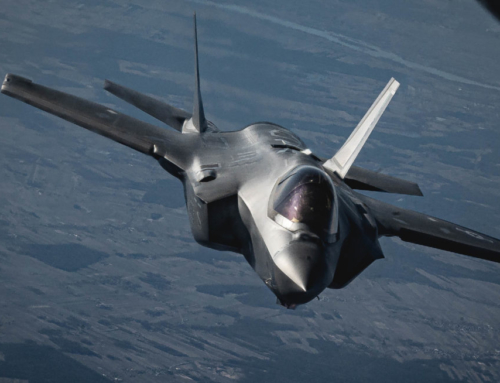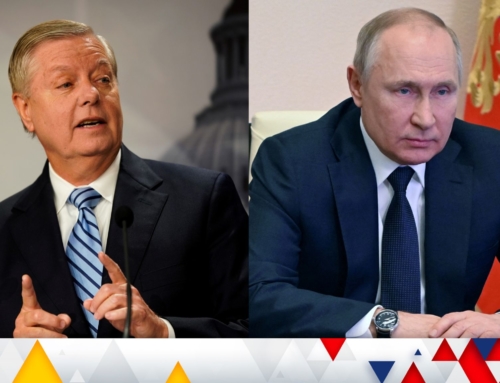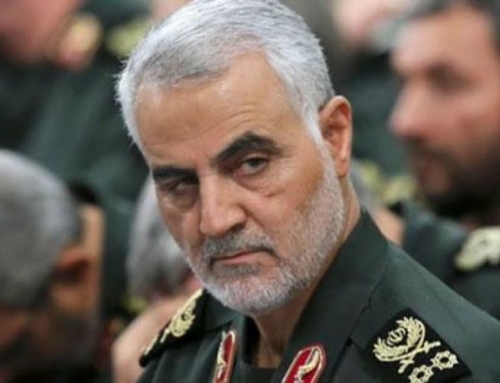
To say the least, the Tomahawk strike on Syria has caused a great amount of chatter throughout the world, but most of it is misplaced and some is outright outlandish. I thought I’d weigh in, not in a partisan way, with an agenda, but simply to clear the air a bit. So here, in no order of precedence, are the primary questions being asked:
Who did the chemical strike in Syria?
The minute I heard that chemical weapons had been used in Idlib, the first thing I thought was, “That makes no sense whatsoever. It has to be the rebels.” Assad, for all his faults as a dictator and a murderous thug, is nothing if not a survivor. Two days before the attack, President Trump acknowledged this. Both his secretary of state and his ambassador to the UN said that his removal was no longer a goal of US policy. For Assad, this is a win-win. Through Russian and Iranian help, he is slowly but surely winning the civil war in Syria, and without outside interference, the endstate is preordained. What, on the surface, would cause outside interference? A horrific act, such as the use of chemical weapons.
So why on earth would Assad do such a thing? It doesn’t make sense. For one, chemical weapons are designed for a specific reason. Yes, they kill, but they do more than that. They deny terrain, block approaches, generally make areas uninhabitable, or instill terror that forces the other side to capitulate. Unlike a bomb that just explodes, they present a problem that has to be resolved long after the strike. It’s why they were invented. In this case, the weapon used did none of that. It wasn’t even in an area with a concentration of rebels. A conventional bomb could just as easily have been used. But it wasn’t. So why on God’s green earth would Assad choose to use it, knowing the outcry that would be engendered, and knowing President Trump’s chosen policy position?
One possibility is he didn’t do the strike, but someone inside his orbit did. Someone who was now antithetical to his desires, and knew the strike would cause massive repercussions that might cause his downfall. I thought about this for a bit, but found it far fetched. Assad officially turned over all of his WMD after the 2013 Obama fake “red line”, which means any he kept behind would have been under serious lock and key. A dissident regime member would need a significant number of like-minded men to load, arm, and use a WMD from an aircraft. The weapons would be kept separate from the usual ordinance, with significant restrictions on their withdrawal, and even more on having them loaded on an aircraft. So, you’d have to have an enormous conspiracy of high level members of the regime who a) knew where the weapons were secretly stored, b) had the ability to get them out to use secretly, and c) hide such a thing from an entire strike package of pilots and planners. It’s much more than a single aircraft, and it just doesn’t hold up to scrutiny.
Another possibility is it was a rebel strike (or a strike on a rebel chemical facility, which is what Russia is claiming). Initially, this held water with me. It’s the only thing that makes sense, given the state of play and the fact that the weapons’ use held no extra value to the regime. A conventional bomb would work just as well, and the downsides to chemical far outweigh any upside. Two things overcame my doubt: One, every intelligence service on the earth (outside of Russia and Wikileaks) states it was the regime. Admittedly, I’ve heard this over an over for the last few days, but still thought, “That doesn’t make sense. Am I falling for a narrative to uphold a strike?” In fact, the alt-right conspiracy theorists are saying just this thing – that it was a “false flag” attack perpetrated by the “deep state” (so American “cuckservatives” did the attack? I can’t keep up…) to engender a response. For them, the term “false flag” is a catch all that’s been used for everything from the Murrow Federal building to Sandy Hook, with 9/11 in between, so I had a little cognitive dissonance when I found myself agreeing with them. But as the saying goes, just because you’re paranoid doesn’t mean someone isn’t out to get you. So what’s the proof that it was the regime?
This strike held something different: It was Sarin nerve gas, and that is not easy to manufacture, and even harder to stabilize and weaponize. The only other time Sarin was used was also by the regime, in 2013. Since then there have been several more chemical attacks in both Syria and Iraq, but they were of a lesser variety, using chlorine or mustard gas, both of which are far easier to manufacture than Sarin. Sarin is a killer of the first order, and is something that requires a state capability to produce and weaponize. You can’t make it in a bathroom, unlike mustard gas.
The fact that Sarin was used implicitly implicates the regime. But maybe it wasn’t Sarin? Maybe anti-Assad forces are just calling it that because they know the repercussions. I’d believe that but for two reasons: 1) As I said above, there have been multiple chemical attacks in this war since the 2013 attack, and none of them have been called Sarin. They’ve all been called chlorine or mustard, so it doesn’t make sense that everyone in Syria would suddenly start calling THIS attack Sarin. 2) Multiple autopsies, both from inside Syria and outside, have stated that the gas used was Sarin. This leads to the conclusion that it was, in fact, Sarin, which leads to the ultimate conclusion that it was the regime. No two-bit rebel group – not even ISIS – would have the capability to manufacture the weapon in question. Which means it was from the regime.
At the end of the day, as idiotic as it appears, it has to be the regime. It’s Occum’s razor here. So why do it? My thoughts: As I said in a blog from 2013, after watching what happened to Qaddafi when he turned over his WMD, Assad would be stupid to do the same, and I didn’t think he would back then. From that blog:
If anything, Assad has looked at the past and realized one of the few things keeping him in power are precisely his chemical weapons. One of the primary – and smart – reasons we haven’t conducted “regime change” with him like we did with Qaddafi is because we’re afraid of those weapons ending up with a bunch of fanatical jihadists. If he relinquishes his weapons, he loses that edge, and as I said before, his survival is the only thing he holds dear. In fact, I’m sure he’s looking at recent past history. Under President Bush, we convinced Qaddafi to give up all of his WMD capability, verified by international inspectors. Fast forward ten years, and President Obama is launching airstrikes to remove him, regardless of the jihadist rebels and regional chaos that would follow his fall. Assad knows full well that if Qaddafi had kept his WMD, there would never have been any NATO airstrikes because the west would have feared the consequences. With the WMD out of play, the west could pretend to be humanitarian by dismantling Qaddafi’s regime, and then allow the country to fall into chaos without worrying about the aftermath. After all, it’s way, way over there and not something that can affect us. Throw WMD in the mix though, and we’d spend a little more time debating the outcome before slinging missiles. No, if Assad’s learned anything, it’s keeping his weapons (and using them), only garners a potential pinprick, but giving them up guarantees his eventual fall.
Turns out, I was right, but having the weapons hidden does him no good. He needs to let folks know he has them, as that is the one thing that will give us pause on his overthrow. He needed a small strike to show that he did, in fact, have such weapons even after he said he’d given them up, and with the early assurances of the new administration saying he was not a priority, he decided to let the secret slip. He was putting the world on notice that he does have WMD, and if we overthrow him they will fall into the hands of the chaos left behind. The only counter-balance to Russian and Iranian attempts to prop up the Assad regime was/is the United States, and Assad had a moment in time when the administration stated that he was no longer a target. Given that pause, he wanted the world to know he HADN’T given up his WMD, and his downfall would cause those to be unleashed in terrorist hands. For him, it was a bulwark to protect his regime, and he read the backlash for what it would be – a limited strike – but also knew the back-room chatter in places that matter for his survival would completely change. Now, removing him would involve significant repercussions beyond just quibbling over who would be in charge after his fall. It would involve containing a clear and present danger to us, and in this gambit, Assad more than likely succeeded. Violent overthrow of his regime is now something that will give us pause, so as loony as it seems on the surface, there is some strategic logic in Assad’s strike.
Or, maybe he’s just batshit crazy. Either way, the above will play out.
What did our retaliatory strike gain?
On the surface, the strike did little to the Assad regime, so little, in fact, that aircraft were taking off from the same airfield we hit less than 24 hours later, but this is shortsighted. The strike did two things – and both of them are game changers. One, it showed that the US is willing and able to use military force for a transgression involving chemical weapons. I said this in 2013, namely that you can’t create a redline and not enforce it. Chemical weapons are unlike others. Some say that it’s ridiculous to go haywire over chemical and then sit back while conventional munitions slaughter – and there is some credence to that – but allowing chemical munitions to be used without repercussions is allowing an expansion of sanctioned violence that is antithetical to the world order. To the layman, it may make little sense that we care whether someone is killed with a bullet or suffocates to death by neurotoxin, but there is a difference, just as there is between dying in battle and getting burned alive on video by ISIS. The fact remains that there is a world order, and that order is predicated on precedence. Allowing these attacks to continue sets precedence for any other two-bit dictator out there. This strike put a much-needed marker down.
Two, on a bigger geopolitical scale, it showed that the United States is willing to use force, period. That, on the surface, should be a given, but with Obama’s missed redline in 2013, it’s most certainly not. Telling someone in a bar that if they bump you one more time, you’ll hit them, is a hell of a lot different than actually getting bumped and making a choice. At that point, you have two responses: Hit them, or not. When you don’t, you tell everyone else in the bar that your bluff was just that – a bluff. Whack them in the head and everyone else sees the blow – and that everyone else is North Korea, Iran, Russia, and every other state that wants to bump us. Trump just put them all on notice that the bump WILL engender a response, and the response of the US arsenal is a pretty heavy thing to go against. Make no mistake, the strike was limited, but the calculations now going on in every seat of government – both friendly and enemy – is wildly different from three days ago. All of Trump’s isolationist rhetoric on the campaign trail just went flying out the window, and the world took notice.
What does this mean for the outcome of the civil war in Syria?
Very little. I hear the pundits on TV breathlessly claiming that the strike has altered the calculus of Russia/Iran/Assad, but that’s not the case. The goal, pure and simple, was to prevent Assad from using chemical weapons in the future, and in that, it will succeed. Assad would be a lunatic to use them again – but if I’m correct, he got what he wanted out of the strike. The world now knows that he DIDN’T give up his WMD, and if he falls, so do the chemical weapons stockpiles. The strike will in no way bring him to any negotiation table – especially if he still has the support of Iran and Russia – and will not lead to more involvement by the United States. It’s not, as some have stated, mission creep whereby we’re now obligated to put boots on the ground to get rid of him. Three days later, Trump’s primary policy remains – defeat ISIS – and I don’t see that changing with the dynamics in play involving two other state systems. At most, we did what we set out to do – namely, we won’t tolerate the use of chemical munitions – but the slaughter will continue with little substantive changes to our strategy. This strike was a one-off, unless Assad does something heinous – and he’s not that stupid.
Was the strike legal?
Yes, it was. Quit your damn bitching, Tim Kaine. Where were you when we went into Somalia, Bosnia, Kosovo, Sudan, or Libya? Oh wait, those were under democratic administrations. That must be why they were legal.
What could happen that we didn’t anticipate? What’s the second or third order effect?
There is a wild card, and that’s the rebel’s use of chemical munitions. Having seen the reaction from Assad’s attack, it would definitely behoove them to use whatever chemical munitions they have in a true false flag attack. It won’t be Sarin, but on the world stage, that may not matter. Now that we’ve sent the signal that further use of chemicals will engender a broader response, the world may see a separate attack of chlorine or mustard, and expect a United States response. Trump – who, by his own admission, relies on gut instinct – may feel forced to initiate a response before the evidence is in – especially if the attack was against coalition troops instead of civilians. American SOF breathing foam out of their mouths as they die will be hard to ignore, and the easiest target for a rapid response – in fact the only target – will be the regime. Even if there are civilian casualties, both the Russians and the Chinese demanded an impartial investigation for this attack, and it’ll be hard to say the next time, “We’re going to wait for proof on this one” when the last time you just pulled the trigger. Trump will risk looking weak, which is something he cannot stand. That, in my mind, is the biggest risk for mission creep – especially if the only proof you have of rebel use is your own intelligence agencies. It’s going to be hard bringing that evidence to the world stage when just a few months ago you were disparaging them by saying, “These are the same people that said Saddam Hussein had WMD.”
Finally, a caveat: Whenever one tries using logic to explain war, one finds that war has a logic all its own. As with all the TV pundits, take what I’ve said with a grain of salt.
UPDATE – 9 APR – Yes, not less than thirty minutes after posting.
I made fun of the alt-right with their homogenous adherence to “false flag” attacks, because they’re really loony, but this – from the left -takes the cake. What if Putin smuggled in Sarin nerve gas to kill civilians precisely so that Trump could attack, and thereby alleviate suspicion about a Putin/Trump nexus? YES! You’ve solved it. It only cost every shred of credibility you could possibly ever own, both in this world and the next. This is some absolutely batshit stuff, and I’m worried about what I’ll see next. Independence Day was only a movie, wasn’t it?










You never cease to amaze me as a globally-brilliant tactician and warrior visionary. The most interesting point you made, for me, is that so many pundits and politicians tend to reason that Assad’s actions can be viewed through a logical lens whereas a national leader’s thought process is rarely logical to those that aren’t exposed to the same facts, opinions, experience and advisors. Try as we might, most of us can’t relate to the regional issues that are bombarding Syria and the area. Thanks for your insight and wisdom, as always.
Thank you.
Way off the mark….sorry!
Because why? I’d be interested to see your logic train on this.
Loved the article. Very thought provoking. I keep hearing that Congress (both dems and repubs) wanted president trump to ask them first before ordering the missiles. Do you think that president trump should have asked congress for permission for that?
I don’t think Trump needed to nor should have consulted congress for this one deterrence strike. It’s reminiscent of Operation El Dorado Canyon in 1986, and falls within the War Powers Resolution. Now, if Trump reverses course and decides he wants to remove Assad by force, then yes, he will most definitely need the concurrence of congress. There is a difference between a single strike for deterrence purposes and a sustained, overarching military campaign to remove a regime.
Hello Colonel – Right after the s gas attack I posted on my FB pg my doubts as to Assads’ responsibility for the attack order. My reasons for this were much the same as your own. The first question I asked myself is who had the most to gain from this? I thought that it could be the rebels as you suggest but I also thought that it could be Israel. Trump and the leadership of Israel recently met and shortly after Israel mounted more air attacks inside Syria. Syria has long been a big problem for Israel – what better way to get rid of this thorn in her back than to have the United States pull the thorn out? Israel has the planes and I am sure Israel has sarin gas available. If true my only real question is – did the United States know and concur with this plan ahead of time or was this done solely by Israel? Of course my conjecture is only that, it is only another possibility. The only thing I am quite sure about is that Assad is not stupid enough to have ordered this and our government and the rest of the world should not be so quick to place the blame on Assad for this.
I respectfully disagree for the following reasons: 1) Israel would only conduct such a strike if it knew it could keep it clandestine. They have the ability to penetrate Syrian airspace without getting shot down, but don’t have the ability to do so without Syria knowing they’ve flown through. They have conducted strikes in Syria in the past, but after every one, the world knew they’d done it even as they remained mum. If there was ANY indication that a third party aircraft had conducted the attack, Assad (and Russia) would have screamed that from the top of the roof. It would be too big of a risk of exposure with little chance for the mission to accomplish its intended end state. 2) Speaking of end state, Syria may be a thorn in Israel’s side, but in no way would they think that dropping chemicals on civilians would have caused Assad’s downfall. Why would they? Three days before the strike Trump said his removal was no longer a US goal, and Trump has been isolationist with regard to Syria from day one, so Israel took those statements, then thought, “Now is the time to strike. We’ll get rid of Assad once and for all.” That makes no logical sense. Every word from Trump’s mouth has been an indicator that he would stay out of Syria. Israel’s calculation would not be that they would reverse it. 3) If there had been collaboration with Trump, what is the end state? According to your theory, Israel struck so that the US would remove Assad. If that was the collaboration, it failed miserably, because our goal was the prevention of future WMD use, and we have made no move at all against the Assad regime. Finally, the use of Sarin is a war crime. Whatever you think of Israel, there is no way they would risk exposure of attacking another sovereign state with an illegal weapon, on the off chance that the Trump administration would reverse course from a plethora of non-interventionist statements. There is just too much risk for very little gain. As for Assad being stupid enough, there is already proof of that. He used Sarin in 2013 with an American administration who’s stated policy was his removal. Nothing happened. Now, we have an administration who’s stated policy no longer includes Assad’s removal, so the risks were minimal. In fact, he calculated correctly, as Trump has not changed his policy.
Assad may not be in complete control of his own forces, presume a Dr Strangelove scenario with a subordinate chomping at the bit to destroy their enemies. Then again Assad may have felt with “regime change” in DC the previously ignored Red Line and with Trump supposedly owned by Putin, Tsar of all the Russians, he was safe. Obviously that was wrong. I do not believe that Putin owns Trump eitherI put that with the usual political infighting.
I would suggest that between our Airbases in Turkey, the US Navy in the Med, coverage from Israel and what forces we have deployed into Iraq, that a leaf cannot fall without us knowing what tree it came from.
ow for the important stuff is your next book titled yet and do you know when Amazon will announce it?
Your analysis as a whole is solid, but I think there are some contours you overlooked that may or may not alter your conclusions.
It’s certainly not excluded, for example, that Turkey supplied sarin to its Syrian proxies. Some U.S. intelligence officials apparently believed this to be the case with the 2013 Ghouta attack (and others may have possibly had their own agenda in not holding the same viewpoint), which may very well explain why the Obama administration ultimately did not enforce its red line (and perhaps added to the souring of the Turkish-American relationship).
To us without access to hard intel or lofty security clearances, there is the word of Eren Erdem, a member of the Turkish parliament who claimed sarin was transported into Syria from Turkey, and also contributed to the speculation, with degrees of evidence, that the Turkish regime had multiple means of collaboration with ISIS. He’s now being charged with treason…
At any rate, the level of material support Turkey has provided not only to “moderate” Syrian rebel factions, but extremists such as Jabhat al-Nusra, and perhaps even ISIS, means that Occam Razor alone cannot eliminate all but the Syrian regime as the source of the sarin, as the Turkish regime fits both the criteria for its production and also would have both the means, and the motive, of using it through proxy. Indeed, Turkey would likely stand to gain more than anyone from the U.S. entering into a conflagration with Russia over Syria.
However, there are reasonable explanations for why the Syrian regime itself could have definitely been responsible. Everything President Trump has indicated on his stance, even well before taking office or even campaigning, could’ve been taken to mean he really would not intervene even in the case of a chemical weapons attack. It is also possible the Syrian regime perceived a degree of assurance that Russia would defend them if the situation got out of hand. Furthermore, Assad and Putin have been decisively rounding up all its enemies into one place, the Idlib province, even literally bussing them in from places like Aleppo through ceasefire agreements. They’ve been corralled, and as the razing of Aleppo offers indication, Assad and Putin have no qualms about utterly annihilating everything and anyone in order to eliminate their opposition.
Regardless of who was responsible, I already believe the Syrian long ago regime forfeited any right to have an air force, and hope the United States will completely destroy its capability to wage aerial warfare, even if that means outright war with Russia.
I agree with the analysis on the surface. There is certainly nothing saying that the rebels could not have obtained Sarin, but all of the open source intelligence indicates the gas attack came from an aircraft (and I’m assuming also classified intelligence, since the intel community is saying it was Assad – and it would be an easier narrative for the Trump administration to blame the rebels if there was any indication). In addition to that, if Turkey HAD given Sarin to the rebels so long ago, why would they wait to use it on civilians? They most definitely used chlorine and mustard gas in a military way, attacking Kurdish and Syrian troops, so if they had Sarin it would make sense that they’d use it in say, Aleppo, vice holding it as a trump card (pun intended) against civilians. Finally, Sarin is a very volatile weapon that, if not stored correctly, decays and becomes unstable and dangerous to the person holding it. The rebels might be given Sarin, but if they don’t use it rapidly, it would decay until it was no longer viable as a weapon. You do, however, present another possibility.
It does seem most likely the Syrian regime was responsible. I found Russia’s statement they’d struck a depot from which the terrorists had been moving chemicals into Iraq to be a strong indicator of guilt, as the Idlib province is severed from any such route (excluding, perhaps, through both Turkey and Iraqi Kurdistan). I’m at a loss for why they’d think alluding to such a plot would lead credence to their counter-allegation, but guilt has that kind of effect…
Regarding the possibility of Turkey having supplied their Syrian proxies with sarin, the concept would’ve been a one-time event with the express purpose of triggering the U.S. to enforce Obama’s red line. With the attack in Ghouta, the gas had been released via rockets as opposed to an aerial bombardment, which at the very least widens the possibilities of who could’ve been the perpetrator. The risk of exposure Turkey would’ve subjected itself to by supplying its proxies with enough sarin for multiple attacks would’ve likely been far too great, though, to keep using it, and counter to Erdogan’s failing attempts to push the U.S. to tilt the balance in the favor of his, Saudi Arabia’s, and Qatar’s regional remodeling.
I have no way of knowing what happened, but wanted to point out there were indeed avenues and motives for the Turkish regime to involve itself in this way, even this time (releasing it in tandem with the SAAF’s bombing?). I understand the quantity required for the Ghouta attack would’ve been around a half ton, and I’m not sure how that translates into shipment size, or how much would’ve needed to have been used this time. The material support Turkey provides their proxies is probably much more limited and scrutinized at this time then the free-for-all they had going on a few years ago, so, again, less likely it was them now.
On a side note, it’s weird to see how many people have jumped right in to psychoanalyze Bashar, and how. The guy was, for a number of years, and likely still is living aboard a Russian naval ship. lol. The types of mentalities being a dictator demands already makes these people special cases, and his lifestyle has been cramped for quite some time, loss of control over an entire country to boot. Russia has simultaneously been both his savior and his captor. Very hard to predict what all that means for how his decision-making goes. Very hard to even presume who’s really making decisions and what kind of roles are being played… fingers crossed someone at the heart of it all writes a screenplay for a television drama series some day. 🙂
Agree with you on the instapundits analyzing everything and anything with respect to Assad. This is a pretty good read. Yeah, it’s open source, so it requires a little bit of skepticism, but there are nuggets of proven fact beyond the conjecture that I found compelling. http://foreignpolicy.com/2017/04/07/syrias-chemical-weapons-kill-chain-assad-sarin/
Definitely an informative read. I personally think there’s more spectre of ambiguity on the Volcano rockets than the author acknowledges, considering how all sides have used the IRAMs, have captured them, and can copy their designs, but ascertaining more about it is a dead end for the vast majority of us at this point.
My main takeaway from the article is how minutiously detailed GRU’s organizational chart on that same chemical weapons program must be. I think it stands to reason Russian military intelligence has reams of intel on and contact with everyone up and down the list. In fact considering the extent Russia uses Shayrat Airbase, it’s hard to imagine they weren’t, at the very least, complicit in the chemical weapons deployment, as they would no doubt know where the munitions were stored and would observe the SAAF’s ongoing activities there.
Did Russia give a green light, purely perhaps in the interest of probing how the United States would respond (in the same vein as buzzing naval ships in the Black and Baltic), or did Assad make the decision unilaterally, a display of authority like you suggest, but for none other than Putin, a message that he’s autonomous, not disposable, nor a bargaining chip (as King Abdullah suggested i re Crimea)?
Up until that point, Assad and Russia owed no other power any terms, except perhaps to the YPG, to whom Russia has been striving to push Assad to take a conciliatory approach, and who would’ve been satisfied with the recognition of their own autonomy as opposed to his ouster…
Great write up, Colonel. I have to say, I initially came at this from a similar (although not identical) perspective as you did, but I wasn’t quite able to get to the same conclusion. Upon reading this, however, I think you’ve probably nailed it. It sure seems like the only thing that makes sense, at leas to my amateur outsider’s brain….
It makes sense in theory that Assad wanted the world to know he still had some WMD under his control so he wouldn’t fall into the Qaddafi trap. But the timing gives me pause. As we heard, DJT and the administration said that Assad was not in the cross hairs. So with Russia and Iran supporting him, why didn’t he just leave well enough alone, at least for a while. With the U.S. turning its attention away, he was in the cradle. He couldn’t have known for sure that the U.S. wouldn’t reverse its policy and pay more attention to him if he used gas. Why now? Why rock the boat?
I’m sure I’m missing something, considering the caliber of the posts on this blog, so I’d appreciate someone filling me in. Thanks, y’all!
Because he knows nothing is written in stone. Attitudes change, elections happen, etc. Ghaddafi is proof positive of that. Precisely because he perceived we had a president who was on his side, he believed this was the least risky time to reveal he still maintained WMD. If the war continues past this current administration, and the next is decidedly more warlike against him, he would not be able to let the secret slip without catastrophic repercussions. On the other hand, if that does come to pass, the next administration will have to grapple with what is now known. Understand, though, that I’m just spitballing a theory. He could have done it simply because he’s a nut job without any second or third order thought. I hate it when people analyze complicated geopolitical events with an eye towards some omnipotent strategic genius, and yet I’ve just done that.
Thanks, Brad. I guess it’s an understatement that, of all people, Assad isn’t a strategic genius and likely is barely capable of any first order thought. So we’re back to the Russians and the question of whose regime it really is. If Assad is, actually or hyperbolically, living on a Russian warship for his safety and may not really be in charge of day to day Syrian policy or action, do you agree with others on this blog that the gas attack could have been more of a Russian probe to test our reaction? If so, what you think the Russians’ takeaway was in the context of Ukraine, the Stans or even DPRK?